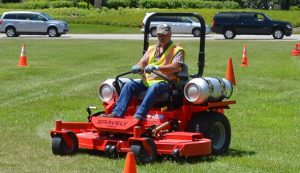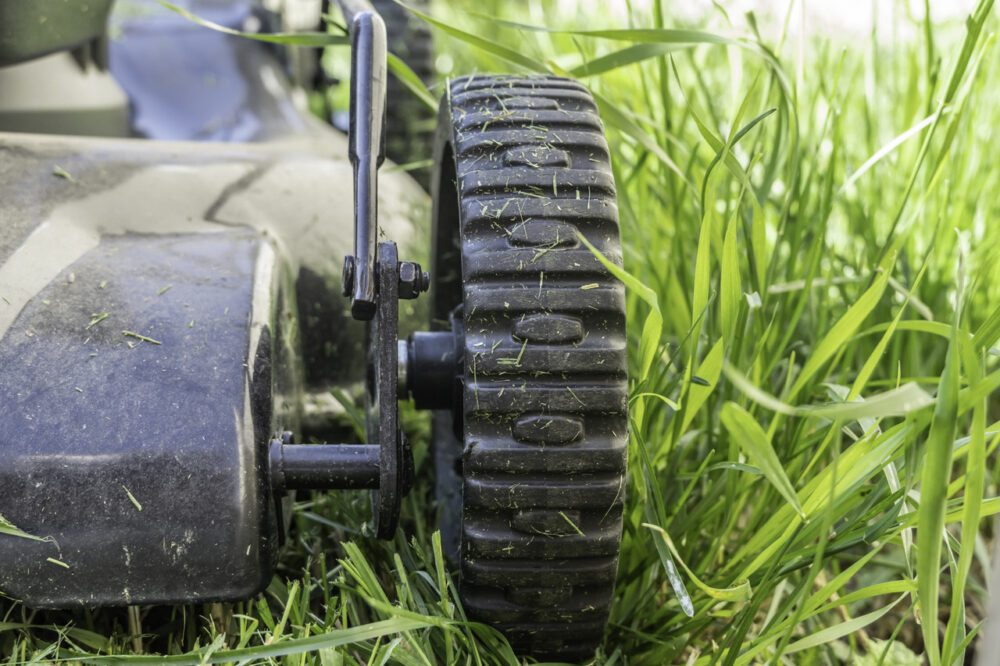Interested in protecting the environment? Switching from a gas-powered lawn mower to an electric model is a step in the right direction. Electric lawn mowers are vastly superior in the cleaner air category. Let’s take a look at the most significant advantages.
Reduce Use of Fossil Fuels
 One of the obvious benefits of switching to an electric mower is that these models don’t need gas and oil. By cutting down on fossil fuels, you can reduce pollution and the number of toxins released into the air.
One of the obvious benefits of switching to an electric mower is that these models don’t need gas and oil. By cutting down on fossil fuels, you can reduce pollution and the number of toxins released into the air.
According to the California Air Resources Board (CARB), using a gas lawn mower for one hour emits as much pollution as driving a car 300 miles. That’s a little less than the distance from Chicago to Des Moines.
Lower Emissions
Gas-powered lawn mowers emit dangerous pollutants, including carbon monoxide, carbon dioxide, hydrocarbons, and nitrogen oxides. These compounds can form harmful ground-level ozone. Inhaling these fumes poses health risks, including cancer, cardiovascular disease, and respiratory problems.
Carbon dioxide is a greenhouse gas that experts believe contributes to climate change. Electric lawn mowers don’t produce emissions, which makes them more environmentally friendly.
No Spills
 Americans spill a surprising amount of fuel when refilling their gas-powered equipment. The Environmental Protection Agency estimates these spills add up to about 17 million gallons per year. Not only is this costly, it’s damaging to lawns and paved surfaces.
Americans spill a surprising amount of fuel when refilling their gas-powered equipment. The Environmental Protection Agency estimates these spills add up to about 17 million gallons per year. Not only is this costly, it’s damaging to lawns and paved surfaces.
It’s also bad for the air when that spilled gas and oil evaporates. It can seep into the ground or end up in stormwater runoff, polluting our water sources. Electric lawn mowers don’t need fuel, which eliminates these hazards.
Less Noise
Electric lawn mowers clear the air of another annoyance: noise. Most electric mowers run at the same decibel level as a group conversation or a washing machine (75 decibels).
Compare that to the gas mower, which registers at 90-95 decibels. That’s equal to a passing motorcycle or food processor. Sounds above 85 decibels are considered harmful.
Given these benefits, switching to an electric mower might seem like an environmental no-brainer.
Another plus: technology for electric lawn mowers has improved dramatically in recent years. Newer models can handle almost any kind of grass. That includes the varieties that thrive in Chicago, like Kentucky bluegrass, tall and fine fescue, and perennial ryegrass.
A cordless, battery-operated model can run for 45 minutes to an hour on average. That’s long enough for a small to mid-sized yard. For a bigger lawn, consider keeping a second battery on hand. Corded models don’t need recharging, but the cord can be troublesome and limiting.
A Smart Green Choice
Electric mowers have a clear advantage when it comes to cleaning the air. They get an additional boost when renewable energy sources provide the power (i.e., not a coal plant). As we move toward a greener world, you can move one step ahead with the equipment you use to maintain your green lawn.
Commercial Mowers
 In addition to electric, alternative fuels such as propane and natural gas also provide clean-burning options, especially for businesses and park districts that have a lot of area to mow.
In addition to electric, alternative fuels such as propane and natural gas also provide clean-burning options, especially for businesses and park districts that have a lot of area to mow.
To learn about alternative fuels for your organization, please download Clean Cities Guide to Alternative Fuel Lawn Equipment.
By Tim Meredith
Eco-friendly landscaper and freelance writer
Tim started mowing lawns as a teenager to earn extra cash. He uses only organic pest control and fertilizers and electric mowers and hedge trimmers. Story provided by LawnStarter, an online marketplace for consumers and lawn care professionals.



